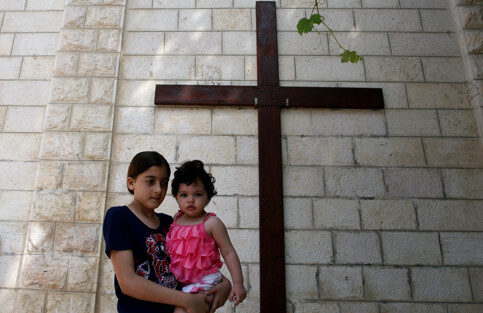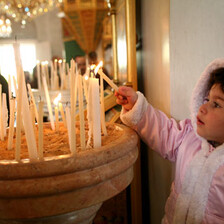The Electronic Intifada 27 September 2007

Palestinian Christian children stand outside the Latin Church in Gaza City, during the Sunday sermon delivered by Father Manuel Musallam, July 2007. Musallam, who is sometimes referred to as “the pope of Gaza” by his congregation, heads Gaza’s tiny community of around 200 Catholic Christians. (Wissam Nassar/MaanImages)
For he is our peace; in his flesh he has made both groups into one and has broken down the dividing wall, that is, the hostility between us. — Ephesians 2:14
“On a pleasant Sunday afternoon in July 2000, members and pastors belonging to local Palestinian Evangelical congregations from the Palestinian territories gathered at the Bethlehem Hotel to celebrate the formation of their council. An American woman who was present at the meeting approached one of the pastors and asked him if she could say a few words to the assembly … When the lady took the microphone, I couldn’t believe the words that came out of her mouth. She professed to the Palestinian Evangelical Christians assembled there that she had a word from the Lord for them. ‘God,’ she said, ‘wanted them all to leave Israel and go to other Arab countries.’ She added that they must leave to make room for God’s chosen people, the Jews. She warned the pastors and the audience that if they did not listen to the instructions which God had given her, God would pour his wrath on them. When her agenda was recognized, one of the pastors came and whisked her away from the pulpit, but not before she served the whole assembly a mouthful of what is known today as Christian Zionism.” [1]
This story, related by Alex Awad, the Palestinian pastor of the East Jerusalem Baptist Church, poignantly reveals the extent to which some Christian voices invalidate the concrete historical realities of their Christian brothers and sisters living under occupation. Such Christian Zionist voices not only ignore the realities of dispossession that have marked the experiences of both Christian and Muslim Palestinians, past and present, but also go so far as to justify violence, dispossession, and discrimination perpetrated against Palestinians.
Stories like these reveal our need to be constantly vigilant about how we read Scripture and how we do theology. We need to ask basic questions about our identities, the agendas that we bring to the text, and about who benefits from our reading and interpretation, so as to avoid doing violence to others.
When we talk about Christians in Palestine-Israel it is important to pay attention to our language of who is “in” and who is “out.” As the story above indicates, some people may not see our Palestinian brothers and sisters as being “in.” From one perspective, Palestinians, be they Christians or Muslims, are usurpers who should leave the land. A reading of Scripture that erases Palestinians from the land is tantamount to a biblically-justified ethnic cleansing of the Palestinian people.
Reflecting biblically on these lines we draw, if we take a look at the ministry of Jesus and the witness of the early church we see that all people are invited to become part of God’s household. In the book of Ephesians, Gentiles are welcomed into “one new humanity” (2:15), because Christ has made peace between Jew and Gentile.
For Christians living in the United States, it is sometimes difficult to think about the church as the new multi-ethnic, multi-racial people of God. Many Christians have a hard time seeing and relating to Christianity in the Arab world as living, vibrant communities of faith with rich spiritual and theological traditions. This may be partly due to our lack of understanding about the shape of Christianity in other parts of the world, and may also be partly due to our often racist and ethnocentric notions of what a Christian should look like.
Christianity in Palestine-Israel today is experiencing what many describe as a crisis. This crisis is not due to the growth of so-called Islamic fundamentalism or the persecution of “believers” by their Muslim neighbors, misrepresentations that are unfortunately used to distract from the realities of military occupation. Instead, the plight of the Palestinian Christian is very much connected to that of the Palestinian Muslim in that both, whether in the occupied West Bank and Gaza or inside Israel itself, are experiencing daily injustices in the form of oppressive policies imposed on them by the Israeli government. Palestinian Christians, like their Muslim brothers and sisters, have experienced a long history of dispossession and have not been immune to Israeli policies of occupation and discrimination. If anything, they have felt more strongly the feelings of forsakenness, knowing full well that many Christians in North America and Europe support without question the state of Israel in its oppression of their people. Meanwhile, daily experiences of humiliation at checkpoints, of land confiscation to make way for the separation barrier, the illegal occupation and colonization of Palestinian territory, lack of mobility and access to basic services, unemployment, poverty, and no sense of hope for a better future for their children all contribute to a growing emigration of Palestinian Christians from the historical land of Palestine.
Struggling with the tensions of feeling forsaken while seeking a critical hope is a great challenge. Despair in the Holy Land is very real, and learning how to talk about God in the midst of such pain requires recognizing that the starting point of any relevant theological reflection must begin with the question “My God, why have you forsaken us?” For Western Christians concerned with justice, peace and reconciliation in Palestine-Israel, discovering our role as one of listening to the cries of despair seriously while being a witness to critical hope begins with seeing our inextricable connectedness — it begins with us not forsaking each other.
As Christians who come from a privileged part of the world, our convictions should compel us to listen to the voices of our Palestinian brothers and sisters, voices too often silenced. As we learn from Jesus’ experience of “God-forsakenness” we should also learn from Palestinians who share their lives with us — their despair and their hopes — what it means to participate in God’s reign of peace and justice.
Timothy Seidel is Peace and Justice Ministries Director for Mennonite Central Committee US. He and his wife Christi served as peace development workers with MCC in the Occupied Palestinian Territories from 2004 to 2007. This article is taken from his chapter “Palestinian Christians: The Forgotten Faithful” found in Under Vine and Fig Tree: Biblical Theologies of Land and the Palestinian-Israeli Conflict (Cascadia Publishing House, 2007).
Endnotes
[1] See Rev. Awad’s article in “Christian Zionism and Peace in the Holy Land,” MCC Peace Office Newsletter 35/3 (July-September 2005; online at http://mcc.org/peace/pon/PON_2005-03.pdf.





